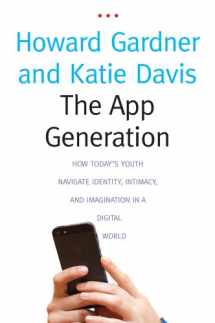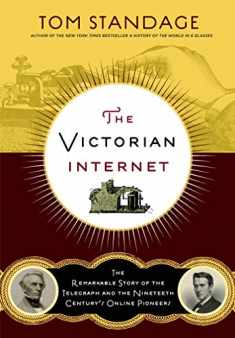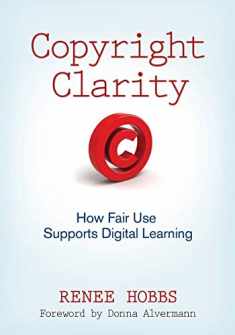
The App Generation: How Today's Youth Navigate Identity, Intimacy, and Imagination in a Digital World
ISBN-13:
9780300209341
ISBN-10:
0300209347
Edition:
Reprint
Author:
Howard Gardner, Katie Davis
Publication date:
2014
Publisher:
Yale University Press
Format:
Paperback
272 pages
Category:
Internet, Groupware, & Telecommunications
,
Networking & Cloud Computing
,
Social Media
,
Internet & Social Media
,
Child Psychology
,
Psychology & Counseling
,
Engineering
,
Social Aspects
,
Technology
,
Child Psychology
,
Psychology
,
Children's Studies
,
Social Sciences
,
Communication & Media Studies
FREE US shipping
Book details
ISBN-13:
9780300209341
ISBN-10:
0300209347
Edition:
Reprint
Author:
Howard Gardner, Katie Davis
Publication date:
2014
Publisher:
Yale University Press
Format:
Paperback
272 pages
Category:
Internet, Groupware, & Telecommunications
,
Networking & Cloud Computing
,
Social Media
,
Internet & Social Media
,
Child Psychology
,
Psychology & Counseling
,
Engineering
,
Social Aspects
,
Technology
,
Child Psychology
,
Psychology
,
Children's Studies
,
Social Sciences
,
Communication & Media Studies
Summary
The App Generation: How Today's Youth Navigate Identity, Intimacy, and Imagination in a Digital World (ISBN-13: 9780300209341 and ISBN-10: 0300209347), written by authors
Howard Gardner, Katie Davis, was published by Yale University Press in 2014.
With an overall rating of 3.8 stars, it's a notable title among other
Internet, Groupware, & Telecommunications
(Networking & Cloud Computing, Social Media, Internet & Social Media, Child Psychology, Psychology & Counseling, Engineering, Social Aspects, Technology, Child Psychology, Psychology, Children's Studies, Social Sciences, Communication & Media Studies) books. You can easily purchase or rent The App Generation: How Today's Youth Navigate Identity, Intimacy, and Imagination in a Digital World (Paperback) from BooksRun,
along with many other new and used
Internet, Groupware, & Telecommunications
books
and textbooks.
And, if you're looking to sell your copy, our current buyback offer is $0.44.
Description
From the famed Harvard psychologist and an expert on the impact of digital media technologies, a riveting exploration of the power of apps to shape our young people—for better or for worse
No one has failed to notice that the current generation of youth is deeply—some would say totally—involved with digital media. Professors Howard Gardner and Katie Davis name today’s young people The App Generation, and in this spellbinding book they explore what it means to be “app-dependent” versus “app-enabled” and how life for this generation differs from life before the digital era. Gardner and Davis are concerned with three vital areas of adolescent life: identity, intimacy, and imagination. Through innovative research, including interviews of young people, focus groups of those who work with them, and a unique comparison of youthful artistic productions before and after the digital revolution, the authors uncover the drawbacks of apps: they may foreclose a sense of identity, encourage superficial relations with others, and stunt creative imagination. On the other hand, the benefits of apps are equally striking: they can promote a strong sense of identity, allow deep relationships, and stimulate creativity. The challenge is to venture beyond the ways that apps are designed to be used, Gardner and Davis conclude, and they suggest how the power of apps can be a springboard to greater creativity and higher aspirations.
No one has failed to notice that the current generation of youth is deeply—some would say totally—involved with digital media. Professors Howard Gardner and Katie Davis name today’s young people The App Generation, and in this spellbinding book they explore what it means to be “app-dependent” versus “app-enabled” and how life for this generation differs from life before the digital era. Gardner and Davis are concerned with three vital areas of adolescent life: identity, intimacy, and imagination. Through innovative research, including interviews of young people, focus groups of those who work with them, and a unique comparison of youthful artistic productions before and after the digital revolution, the authors uncover the drawbacks of apps: they may foreclose a sense of identity, encourage superficial relations with others, and stunt creative imagination. On the other hand, the benefits of apps are equally striking: they can promote a strong sense of identity, allow deep relationships, and stimulate creativity. The challenge is to venture beyond the ways that apps are designed to be used, Gardner and Davis conclude, and they suggest how the power of apps can be a springboard to greater creativity and higher aspirations.


We would LOVE it if you could help us and other readers by reviewing the book
Book review

Congratulations! We have received your book review.
{user}
{createdAt}
by {truncated_author}




